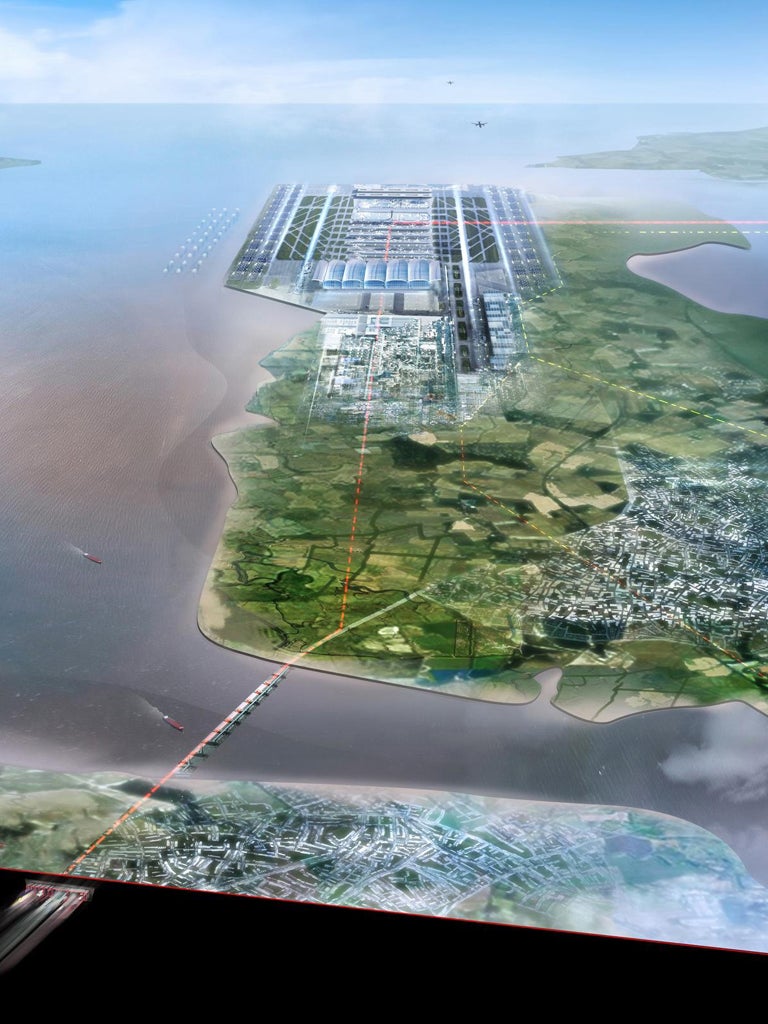The Battle of Boris Island
The fate of hundreds of thousands of migrating birds and the environment are hanging in the balance as the future of a possible airport on the Thames estuary is argued over by the London Mayor and the Prime Minister

Your support helps us to tell the story
From reproductive rights to climate change to Big Tech, The Independent is on the ground when the story is developing. Whether it's investigating the financials of Elon Musk's pro-Trump PAC or producing our latest documentary, 'The A Word', which shines a light on the American women fighting for reproductive rights, we know how important it is to parse out the facts from the messaging.
At such a critical moment in US history, we need reporters on the ground. Your donation allows us to keep sending journalists to speak to both sides of the story.
The Independent is trusted by Americans across the entire political spectrum. And unlike many other quality news outlets, we choose not to lock Americans out of our reporting and analysis with paywalls. We believe quality journalism should be available to everyone, paid for by those who can afford it.
Your support makes all the difference.Standing (almost) shoulder to shoulder and looking rather pleased with themselves, these are the two men who are causing havoc in Downing Street and across Whitehall over the controversial "Boris Island" airport – and the Government's entire agenda.
To some, Steve Hilton and Boris Johnson are maverick geniuses-on-bikes, whose free wheeling and free thinking are desperately needed to break the stalemate of the coalition, and think creatively beyond the tight constraints of economic austerity.
But to others, they are a tandem menace, overriding ministers in their own departments and provoking David Cameron and George Osborne into ambitious decisions that are neither sensible nor economically viable.
The Battle for Boris Island, which spilled out into the open last week, illustrates how government policy is being driven by what one source described as a "dangerous axis" of the London Mayor and the PM's strategy chief.
One Whitehall source said: "There is the Quad [Mr Cameron, Mr Osborne, Nick Clegg and Danny Alexander], and then there are Steve and Boris. You couldn't call it a Sextet because you could never get everyone playing the same tune."
Despite the Prime Minister telling local MPs last year that the Thames estuary airport would not go ahead, and the Department for Transport also ruling it out, a consultation document in March on the future of airport capacity will pave the way for the "Boris Island" project. In his autumn statement last November, the Chancellor laid some groundwork by announcing a watering-down of protection of natural habitats in planning decisions.
Construction of the £20bn hub would cause huge damage to the local environment, say opponents, including wrecking the habitat of migrating birds every year and in turn increasing the risk of a plane being hit by bird strike. There is also little to justify the massive economic cost because creating a new hub to the east of the capital would drive business away from Heathrow.
One theory is that the disclosure – revealed in the Boris-friendly Daily Telegraph – was designed to help Mr Johnson's re-election as London Mayor in May with plans being quietly dropped at a later date.
Yet there is serious momentum behind the idea. Besides Mr Johnson, Mr Hilton is a driving force behind the plans. The No10 strategy guru, who despite rumours that his influence is on the wane remains instrumental at the heart of government, has a key ally in Oliver Letwin, Mr Cameron's policy adviser and Cabinet Office minister. Before the plans were leaked to The Telegraph on Wednesday, Mr Letwin was spotted having a "heated" debate in the Members' Lobby in the Commons with Theresa Villiers, the aviation minister who is thought to be opposed to the airport.
As recently as last November, Mrs Villiers wrote a letter to Mark Reckless, whose Rochester and Strood constituency in Kent is among those that would be affected by airport, reassuring him: "The Department for Transport has no plans for a new airport in the Thames estuary, nor any other part of Medway or Kent. We want to get the most out of existing infrastructure in the South-east ... The Government is committed to developing a new policy framework for aviation which supports economic growth while addressing the environmental impacts of flying."
Plans for an airport along the Thames estuary were investigated under the previous government's Aviation White Paper, before it was comprehensively ruled out in 2005.
With Chris Huhne's political career hanging in the balance over the next few weeks over his alleged speeding offence, there are fears that, if he is forced to stand down as Climate Change Secretary, there will be no one to speak up for the green agenda in government.
Mr Hilton – alongside Mr Letwin – is also blamed for pushing through the Government's controversial Health Bill, despite misgivings at the heart of No 10 and among senior Lib Dems. While some of Mr Hilton's more provocative ideas – such as scrapping maternity leave to boost economic growth – have been laughed off, he remains an influence on Mr Cameron: the roots of the PM's attack on "crony capitalism" last week were in Mr Hilton's Good Business public affairs consultancy, founded in 1997.
With Mr Johnson, the influence on Mr Cameron is rather more basic.
As Mr Johnson's biographer, Andrew Gimson, wrote in the Financial Times yesterday: "He [Boris] has made the airport a test of Mr Cameron's and Mr Osborne's virility.
"Are they strong enough to uphold London and the UK's competitiveness, or are they a pair of weaklings who will collude in national decline?"
Join our commenting forum
Join thought-provoking conversations, follow other Independent readers and see their replies
Comments